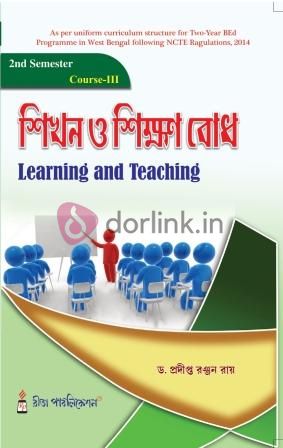Writer : Dr. Pradipta Ranjan Ray
- Shipping Time : 4 Days
- Policy : Return/Cancellation?
You can return physically damaged products or wrong items delivered within 24 hours with photo/video proof.
Contact Customer Support for return initiation and receive return authorization via email. Securely package for return.
Refunds for eligible returns are processed within 7-10 business days via Bank Transfer.
Order cancellation allowed within 24 hours of placing it. Standard policy not applicable for undamaged/wrong product cases. Detailed info. - Genre :NA
- Publication Year : NA
- ISBN No : NA
- Binding : No Binding Available
- Pages : NA
- Weight : NA
- Height x Width x Depth : xx Inch
If so, it will be notified
About the Book
:
1st Half: Learning
Unit I: Understanding Learning:
· Nature of learning: learning as a process and learning as an outcome
· Types of learning: factual, associations, conceptual, procedural, generalizations, Principles and rules.
· Remembering and Forgetting—Factors of remembering—encoding, storage and retrieval. Information processing approach; Causes of forgetting; Strategies for effective memorization.
Unit II: Factors Influencing Learning:
· Concept, nature and types of motivation—intrinsic, extrinsic and achievement.
· Role of teacher in addressing various factors influencing learning—a few strategies—cooperative learning, peer tutoring, collaborative learning.
Unit III: Learning Paradigms:
· Behavioristic Learning—Concept of connectionism (Thorndike) and conditioning (Pavlov & Skinner) and their educational implications.
· Cognitive Learning—Concept of Gestalt and its educational implications; Discovery learning (Bruner), Cognitive Constructivist Learning (Piaget)
· Social Cognitive Learning—Concept (Bandura), nature and implications. Teacher as role model.
· Social Constructivist Learning—Concept of Vygotsky, nature and implications.
· Humanistic Viewpoint of Learning—Carl Rogers (Self Concept Theory)
Unit IV: Overview of theories of Transfer of learning:
· Concept, Importance, Nature and Types of Transfer of Learning
· Theories of Transfer of Learning
· Methods of enhancing Transfer of Learning
Unit V: Organization of Learning Experiences: Issues and Concerns:
· Role of school—Guidance, Mental health, Co-curricular activities.
· Strategies for organizing learning for diverse learners—Brainstorming, Within class grouping, Remedial teaching, Enrichment programme.
2nd Half: Teaching
Unit I: Understanding Teaching :
· Teaching: Concepts, definition, nature and characteristics factors affecting teaching.
· Relation between Teaching, Instruction and Training.
· Maxims of teaching—Role of teacher in effective teaching.
Unit II: Models of Teaching:
· Concept Attainment Model (CAM)
· Advance Organizer Model (AOM)
· Inquiry Training Model (ITM)
Unit III: Task of Teaching:
· Task of teaching: meaning, definition and variables in teaching task.
· Phases of teaching task: pre-active, inter-active and post-active.
· Essentials of effective teaching.
Unit IV: Levels & Approaches of Teaching:
· Levels of Teaching: memory, understanding and reflective levels of teaching
· Approaches to Instruction: Constructivist approach to teaching, Cooperative and Group Discussion, Games, Debate, Quiz and Seminar.
· Programmed Instruction (PI) & Computer Assisted Instruction (CAI)
Unit V: Skills of Teaching:
· Skills of Teaching: Concepts, definition.
· Micro-teaching: Meaning and Procedure
· Developing Teaching skills: Introducing the lesson, Questioning, Use of teaching aids, Reinforcement and Illustration.
Modification of Teacher Behaviour-Flanders Interaction Analysis of Category System (FIACS

